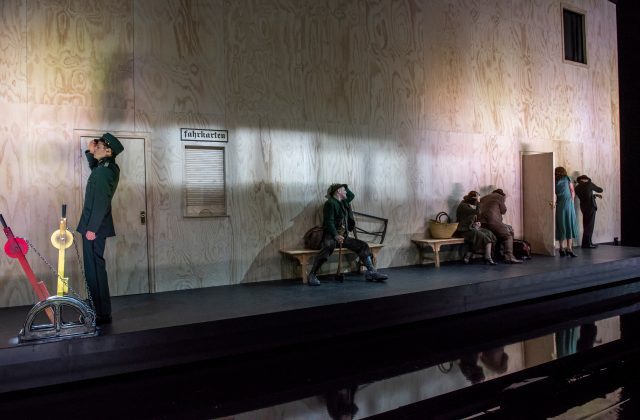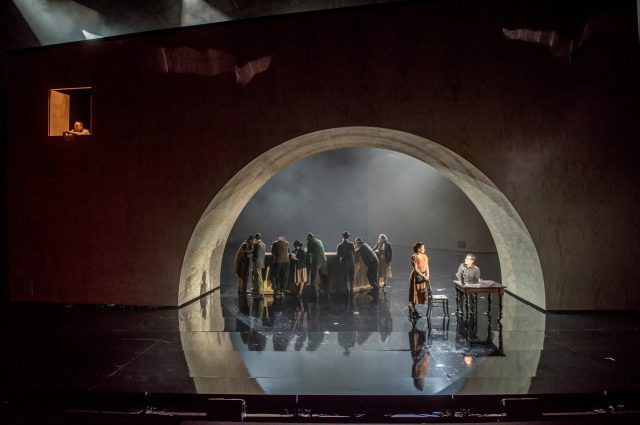
Stationmaster Thomas Hudetz (Luke Kirby) salutes as train passes by in Judgment Day (photo by Stephanie Berger)
Park Ave. Armory, Wade Thompson Drill Hall
643 Park Ave. at 67th St.
Monday – Saturday through January 10, $55-$195
212-933-5812
www.armoryonpark.org
In his 1936–37 work Judgment Day, Austro-Hungarian novelist and playwright Ödön von Horváth warns of the rise of fascism in Germany, comparing it to a speeding train approaching a station that has no idea it’s coming. That’s the central motif in Richard Jones’s admirable if uneven new production, adapted by Christopher Shinn, that opened today at Park Ave. Armory for a run through January 10. Jones, who presented a fierce version of Eugene O’Neill’s The Hairy Ape at the armory in 2017, once again makes unique use of the building’s vast Wade Thompson Drill Hall; Paul Steinberg’s set features oversized, flat, painted plywood trees around the back, sides, and corners and two giant, movable blocks of unpainted wood, like a child’s toys, one in the shape of an arch, the other flat and angled like a stray wall from The Cabinet of Dr. Caligari. Mimi Jordan Sherin’s stark lighting creates distinct reflections on the shiny black floor, like the characters’ souls on display.
It’s the 1930s, and a lumberjack (Andy Murray), the gossipy Frau Leimgruber (Harriet Harris), and a traveling salesman (Jason O’Connell) are waiting for a local train. Stationmaster Thomas Hudetz (Luke Kirby) emerges only to ring the signal bell, standing at attention and saluting as the express roars by, thrillingly portrayed by Drew Levy’s immersive sound design and the actors’ dramatic reactions. After seeing off her fiancé, butcher Ferdinand (Alex Breaux), ingénue Anna (Susannah Perkins) teases the straitlaced Hudetz as his shrewish wife, Frau Hudetz (Alyssa Bresnahan), watches from above. Anna makes an unexpected and unwelcome move, beginning a chain of events that leads to the death of eighteen people, including a track worker (O’Connell) and train driver Pokorny (Maurice Jones) but leaving a witness, stoker Herr Kohut (George Merrick).

Paul Steinberg’s set features two large movable wooden structures (photo by Stephanie Berger)
A policeman (Charles Brice) and detective (Joe Wegner) arrive to find out what happened, but falsehood, deception, and long-simmering desires and grievances soon boil over. “I’m telling the truth! I swear to everything!” Frau Hudetz argues. Frau Hudetz’s brother, pharmacist Alfons (Henry Stram), becomes an outcast even after he disowns his sister. “Everything is connected,” he insists, but no one is listening to him. Guilt and mob mentality tear at the fabric of this small community, resulting in yet more death and destruction. “People are so fickle,” waitress Leni (Jeena Yi) says. “Who gives a shit about people,” Hudetz responds.

Paul Steinberg’s set steals the show in new production at Park Ave. Armory (photo by Stephanie Berger)
Jones’s staging often makes the characters look like little figures in a dollhouse, dwarfed by the two wooden blocks, as if they’re being manipulated by unseen forces. In his sharp uniform (the costumes are by Antony McDonald) and direct speech, Hudetz resembles a Nazi. “I was always a diligent official!” he says over and over, reminiscent of what would later become the Third Reich excuse “I was only following orders.” Judgment Day is a biting indictment of prewar German morality, written by Horváth after he had fled Germany and shortly before he died in Paris when struck by a tree branch during a thunderstorm at the age of thirty-six. The parable can’t quite carry the weight of the production through its ninety minutes, drifting between Expressionism and realism while evoking the style of Bertolt Brecht and a streamlined Robert Wilson, sometimes getting stuck in between. But there are numerous breathtaking moments as Jones (Into the Woods, The Trojans), Shinn (Dying City, Where Do We Live), and Horváth (Tales from the Vienna Woods, Youth without God) take aim at the spread of fascism and groupthink, in the 1930s and now.